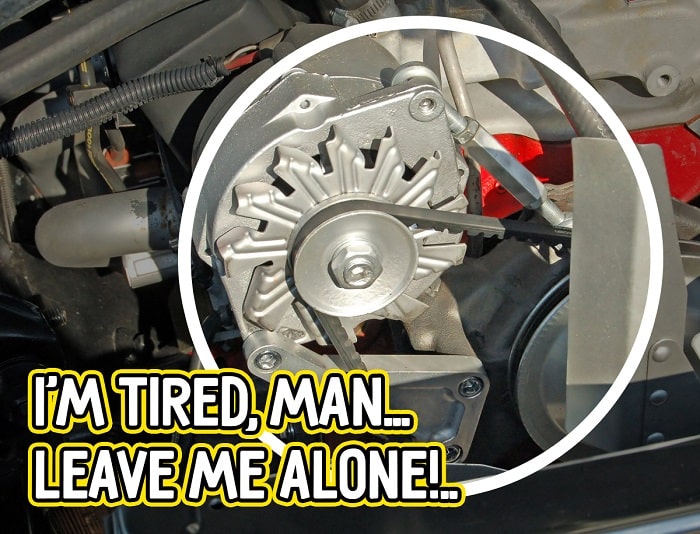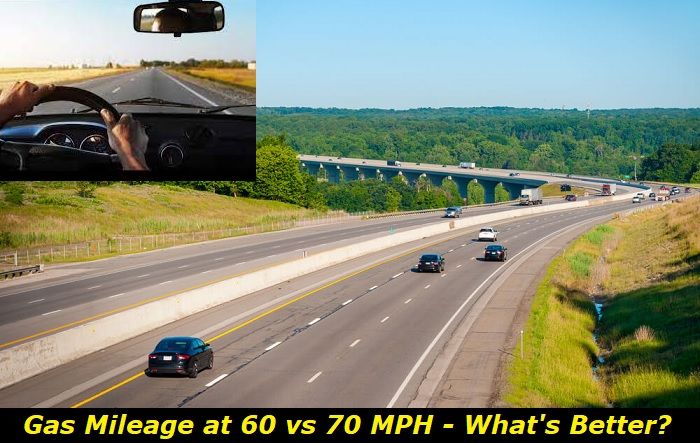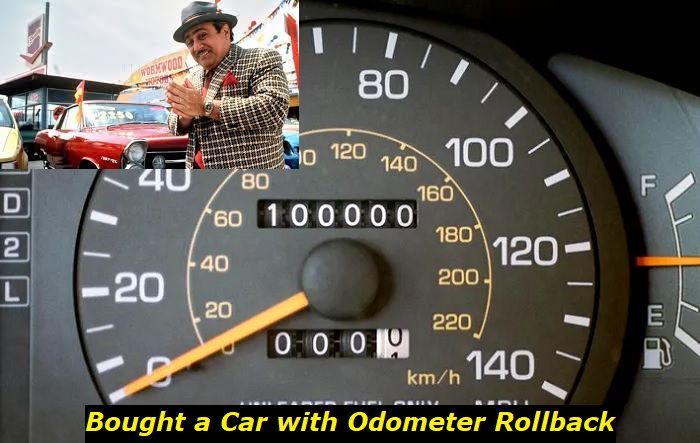
The alternator and the car battery are tasked with providing electricity to your car for startup and for powering all the necessary car electronics. As such, both of these are vital components, and the car can not run if they malfunction. To avoid such circumstances, and solve these issues proactively, be sure to read this article.
Here are the signs of a bad alternator:
- Dim Lights
- A dead battery
- Warning light
- Flickering lights
- Slow accessories
- Belt issues
- Strange noises
- Strange smells
- Car stalling or unable to start
- Broken or loose connections
- Various electrical issues
- Corroded cables
The Alternator – The Essential Rundown
As we all know, cars are powered by an engine that receives energy from combusting both oxygen and fuel. However, modern-day cars are equipped with all sorts of wizardry, technology, and gadgetry which can be used both when the car is on and when the car is off.
As such, cars also come equipped with a small 12V battery, but this battery can not last forever which means that it needs continuous charging in order to provide power. This is where the alternator steals the show by transforming mechanical energy into electrical energy.
The alternator is connected to the engine's crankshaft by a serpentine belt and as this belt turns it also spins the alternator's rotor which creates electricity. However, batteries can only store direct current (DC) which means that the alternating current (AC) electricity produced by the alternator needs to be converted by the diode rectifier before it can be sent to the battery.
Symptoms Of A Bad Alternator
Dim Lights
Whenever your interior accessories, headlights, dim lights, taillights, the tachometer, and odder electrical components start dimming, it usually means that your alternator is not working, more specifically, your alternator is not charging up the battery. If your less important accessories start dying/dimming first, it’s a definite sign of a bad alternator.
A Dead Battery
This symptom is rather obvious, but it does not always mean that the alternator is at fault. If you leave your headlights on overnight, or you forget to turn off the dim lights or other in-car accessories, this will drain your battery in the same way because the alternator will not work while stationary the car is turned off. To find out, you must jump-start the car.
Warning Light
If you come across a flashing/still orange battery warning light, or a red battery light, it usually indicates that something is wrong with your alternator or sometimes your battery. This light comes on if your alternator voltage levels drop below a certain threshold. If the light persists even after starting the car, it often leads to a faulty alternator that needs replacing.
Flickering Lights
The alternator and the battery are closely related, as such, whenever something happens with one of them, the other usually reacts. As such, whenever any of your interior or exterior lights start flickering, it usually means that there is a power deficiency that usually leads to an incoming alternator warning light. It’s always best to park the car up if this starts happening because it can also affect your power steering and many other vital car components.
Slow Accessories
Your power mirrors, power sunroof, power windows, and all the rest of in-car accessories are controlled through complex computers and wiring harnesses which tend to seep lots of energy. For example, if you experience slow winding windows or your power liftgate does not work, chances are that there is a battery/alternator issue. If your panoramic roof takes ages to open it is probably because it lacks proper juice.
Belt Issues
A timing belt runs in unison with the alternator, so if the belt fails for whatever reason, the alternator is also bound to fail eventually. Even though it may seem like a grave issue, most commonly it's only a belt that does not work with proper tension. This issue can be resolved quickly by just propping up and the hood and checking for yourself. Either way, be sure not to drive the car whenever you sense that you might be having issues with the belt.
Strange Noises
Strange ‘’whining’’ or ‘’growling’’ noises are also often symptoms of a failing alternator. Such sounds are associated with many other mechanical issues, but if you experience strange noises with any other symptoms from this list, it's most definitely the alternator. A faulty alternator usually causes issues with some engine bearings which in turn cause strange noises. If these sounds are accompanied by any other symptom from this article, your alternator is likely the one to blame.
Strange Smells
If you sense electrical fire smells or smells of burning rubber, your alternator is most likely working way too hard and it's possibly even burning your wires in the process. Your alternator might be failing even without these strange smells, but if you sense them, they often lead to a bad alternator. Don’t drive the car whenever you sense something burning in order not to cause a fire.
Car Stalling Or Unable To Start
Whenever your alternator starts failing, it starts causing many problems throughout the car. One of which is the inability to start the car up. If these issues are accompanied by flashing interior and exterior lights, your alternator is likely to be causing it. If your car stalls and loses power-assisted steering, it usually means that your alternator is to blame. Park the car up and ask for assistance as driving with inconsistent power steering is dangerous.
Broken Or Loose Connections
Sometimes you may think that your alternator is malfunctioning because your battery is not being charged even after you’ve successfully replaced the battery. Indeed, this usually leads to a bad alternator, however, it can sometimes point towards broken or loose connections which are in charge of transferring the power towards the battery.
Various Electrical Issues
The alternator is the beating heart of the car’s entire electrical system which means that it affects every process in a car that requires electricity. This usually means that if your alternator is causing any issues, you will soon start witnessing various car electrical systems starting to act weird. This can usually be due to the inconsistent current provided by the car’s alternator and the battery.
Corroded Cables
Corrosion is a common enemy of cars because it can cause issues without you even noticing them. Sometimes the alternator might be in perfect running order even though it seems like it’s undercharging or not charging the battery at all. This might lead you towards replacing the entire alternator or even the battery, but be sure to check the alternator for signs of rust because this can sometimes seem like the alternator is to blame.
FAQ Section
How Much Does A New Alternator Cost?
If everything else fails, you need to invest in a brand-new alternator. This means that you are likely going to spend anywhere between $500 and $1500 depending on the car in question. However, these prices tend to vary significantly depending on the car’s make and model, the car’s age, the type of the alternator, and the general market supply and demand.
Can I Fix A Broken Alternator, And Is It Worth It?
It is possible to fix a broken alternator, however, it largely depends on what’s wrong with it. Although fixing an alternator might save you some money, it's never a good idea to skimp out on vital car components. As such, be sure to replace the alternator rather than just repair it if the issue at hand is more serious. Even after you repair the alternator, it still does not mean that it will last longer than a few thousand miles.
Does The Battery Always Die If The Alternator Dies?
The battery almost always dies after the alternator does. This is because the alternator is essentially a battery charger, and if you don’t charge a device, it is bound to die eventually. However, sometimes the battery is not dead completely because all it takes is a decent state of charge and the battery will continue to deliver power. Even so, the longer the battery stays without power, the more likely it is to die with it.
Can A Bad Alternator Destroy A Good Battery?
A bad alternator can indeed destroy a good battery, especially so if the alternator problem is down to overcharging. Undercharging the battery is also an issue, but the alternator is far less likely to destroy a battery while undercharging it. These issues usually span for a long time but ultimately lead towards a dead battery. As such, it's always a good idea to visit an experienced mechanic the moment you sense your electrical system acting up.
How To Tell If It's Your Alternator Or Your Battery?
Whenever your car won’t start, take out the jumper cables and try to jump-start the car. If the car keeps running after jumping it, it is likely the battery. If the car stalls, it's likely either the alternator or both the alternator and the battery. Because these two are so interlinked and they constantly rely on each other to provide power, if one goes bad chances are that the other is soon to follow.
About the authors
The CarAraC research team is composed of seasoned auto mechanics and automotive industry professionals, including individuals with advanced degrees and certifications in their field. Our team members boast prestigious credentials, reflecting their extensive knowledge and skills. These qualifications include: IMI: Institute of the Motor Industry, ASE-Certified Master Automobile Technicians; Coventry University, Graduate of MA in Automotive Journalism; Politecnico di Torino, Italy, MS Automotive Engineering; Ss. Cyril and Methodius University in Skopje, Mechanical University in Skopje; TOC Automotive College; DHA Suffa University, Department of Mechanical Engineering






Add comment